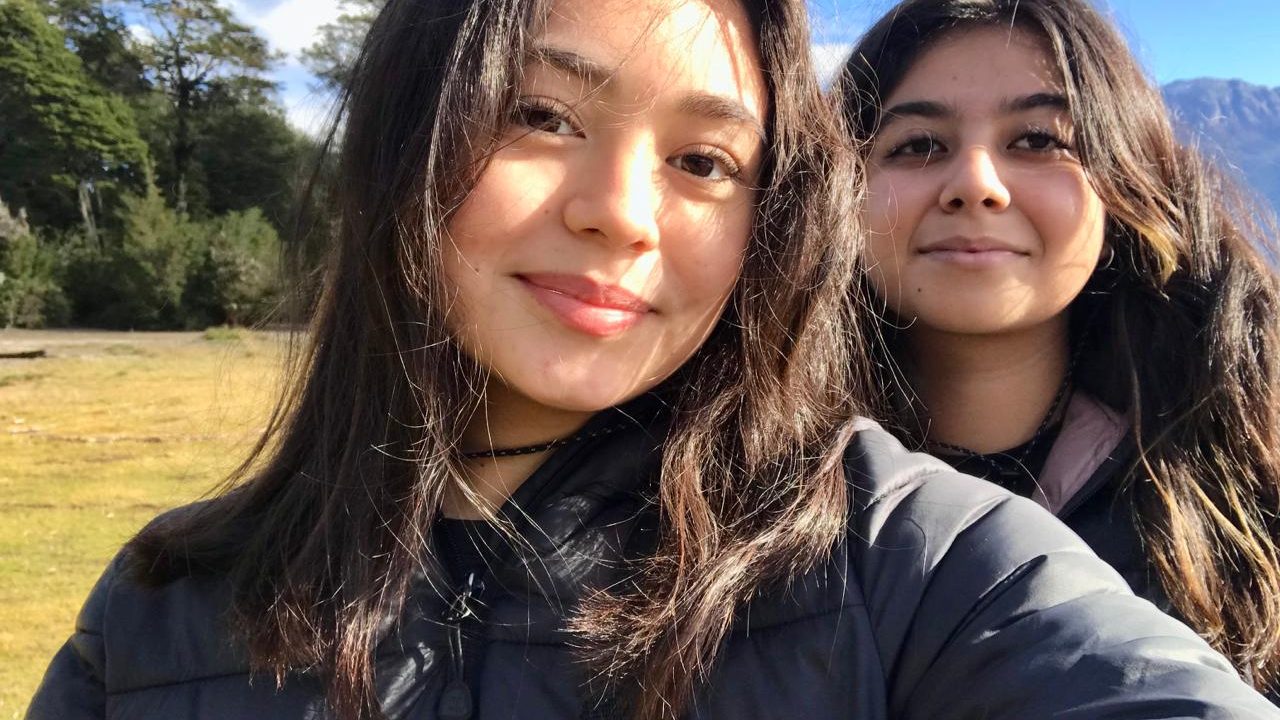The U.S. National Science Foundation National Radio Astronomy Observatory (NSF NRAO) has received funding to expand its study of an invisible—and crucial—scientific and technological resource: the radio spectrum.
Recent News
Largest Oort Cloud Comet Ever Observed Reveals Its Secrets with ALMA’s Powerful Gaze
A team of astronomers has made a groundbreaking discovery by detecting molecular activity in comet C/2014 UN271 (Bernardinelli-Bernstein)—the largest and second most distantly active comet ever observed from the Oort Cloud.
Unusual stellar nurseries near our galaxy’s center puzzle scientists
New research led by Dr. James De Buizer at the SETI Institute and Dr. Wanggi Lim at IPAC at Caltech revealed surprising results about the rate at which high-mass stars form in the galactic center of the Milky Way.
Students from San Pedro de Atacama Travel to Santiago and Concepción to Make Their STEM Vocations a Reality

Iris González and Camila Pérez.
Iris González and Camila Pérez lived their entire lives in San Pedro de Atacama, they were excellent students at the Toconao Educational Complex and initially dreamed of being doctors. Today, after participating in the “PROVOCA” STEM Girls and Women Mentoring Program, they choose biology and aerospace engineering, thus increasing female participation in little-known and highly masculinized careers.
Feb. 11 marks the International Day of Women and Girls in Science, a date that makes sense in times when public policies seek to reduce the gender gap, especially in those disciplines with low female participation such as science, technology, engineering and mathematics (STEM).
This is the mission embraced by the PROVOCA initiative (of AUI/NRAO), which seeks to promote, guide, accompany and retain female talent in STEM. Two young people from San Pedro de Atacama, who were part of this mentoring program, today confirm their vocational decision. This is the case of Iris González, who travels to Santiago to study biology; and Camila Pérez, who is moving to Concepción to enter common plan engineering, and probably later opt for aerospace engineering.
González and Pérez (both 19 years old) have lived their entire lives in San Pedro de Atacama and studied at the Toconao Educational Complex. Living in this town so close to the ALMA Observatory and the Salar de Atacama, they experienced science up close in a privileged natural setting, to today become the first university students in their families.
Accustomed to the tranquility of her town and the natural beauty, González explains that from a very young age she became interested in science. In fact, she first became interested in the human body and health issues, but then she became fascinated with the cellular and molecular. A couple of years ago she was a park ranger in the Valley of the Moon, a place where she learned that certain researchers were studying microorganisms compatible with life on Mars.
“I was always captivated by the life of microorganisms, biology and chemistry. Studying biology, I think, will give me a broad perspective to understand everything from the most global to the smallest things in life,” said González. “Since I was a child, I imagined myself being a scientist working in a laboratory, discovering the unimaginable.”
She is excited to make her dream come true today and move to Santiago to study her degree at the Pontifical Catholic University. She will leave the peace of her orange-hued town to live in the bustle of the capital. González explains that her school greatly influenced her vocation, since it has a scientific-mathematical emphasis, and although she spent several years without a functional laboratory, her teachers used their ingenuity to find instances of participation in scientific competitions or give them the opportunity once a year to conduct a master class on a specific topic.
“Closely linked to the work of ALMA, many students at my school aspire to become scientists and engineers, or dream of seeking new horizons in Chile or outside the country. Science in San Pedro is a gateway to the world,” said González.
Thanks to her participation during the pandemic in a virtual meeting of the PROVOCA initiative, González had the opportunity to meet an American biologist working in Valparaíso, motivating her to enter the mentoring program.
“In PROVOCA, I discovered a kind of fraternity of scientific women. This network opened my mind to imagine a possible future from STEM. Living in a place so far from the capital, it is very difficult to meet real women who work in the sciences, and I feel that this program opened up a whole world of options and connections with other girls, young women and women,” she added.
Initially, González had decided to follow medicine, but after a year’s break to reflect on her future, she opted for biology after carefully researching the curriculum. After this decision, her family supported her unconditionally. She assures that her friends and family are as excited as she is about this new challenge and that they only hope that she feels fulfilled and very happy.
An admirer of the Chilean biologist Ana María Lennon, Director of the Department of Immunity and Cancer at the Curie Institute in France, González today feels that the future has no limits. She imagines herself researching at a university in the world and inspiring other girls like her, who live in a corner of Chile, to follow her dreams in STEM.
“At PROVOCA there are many mentors in physics and mathematics, and I believe that as a biologist I can collaborate in diversifying interest in STEM,” she said. “There I found many women who had a hard time making a space for themselves.”
Until 2022, Camila Pérez was very convinced of pursuing medicine, a career that has a lot of science but also service. After a long process of self-knowledge, which was influenced by her mentoring sessions at PROVOCA, she concluded that she was looking for a career more closely linked to mathematics and technology. In the same program she met a young mentor, an aerospace engineering student (Tatiana López, from Concepción), who showed her an aspect of this STEM career that fascinated her from the beginning. Although it was a difficult decision, since her family was very excited about the idea of her becoming a doctor, her decision is clear today and she has enrolled to study at the University of Concepción, with all the support of her family.
“This process was an awakening. I imagined studying medicine, but I didn’t see myself practicing that profession. I knew that it would be shocking to announce this vocational change to my family and for that I did a lot of research, since I was sure that my parents would be concerned about the work field aspect of this new career,” said Pérez. “Although engineering does not have as clear a seal of social service as medicine, I do believe that scientific dissemination fulfills that role, precisely to bring unusual careers closer to young people who live far from big cities and universities. Physics, mathematics and putting things together with my own hands are skills that identify me and are fundamental to building my future.”
Pérez has a long-standing relationship with PROVOCA. She was one of the two students from Toconao who participated in the role models meeting organized by AUI/NRAO in 2018, from which the PROVOCA initiative was born. Also, in 2019 she was part of the Sister Cities Exchange Program (Ciudades Gemelas in Spanish), which allowed her to travel to the U.S. and live the experience of getting to know another school community closely linked to astronomy due to its proximity to the Very Large Observatory (VLA) in New Mexico, Magdalena. In this experience, she visited the observatory and developed a solar clock project considering the worldview of the Atacama culture, in addition to being a student for a day at the Magdalena educational establishment.
Later, being part of PROVOCA mentorships encouraged her to research different STEM careers, so that she made her decisions based on current and honest information shared by her mentors. The program is designed to give participants a realistic look at each STEM career track. Pérez hopes that her experience of changing her vocation encourages other girls to investigate other possibilities that fit her interests and abilities.
“You don’t have to be afraid of changes. Life gives us many opportunities to continue learning and we must be open to those possibilities. The important thing is to make informed and safe decisions, and not close yourself to a single option. In this career, I will be able to apply my mathematical and physical skills in the development of aircraft, which excites me very much,” she concluded.
This news article was originally published on the NRAO/AUI website on February 11, 2024.
Recent News
NSF NRAO Leads Critical Spectrum Studies to Safeguard Radio Astronomy
The U.S. National Science Foundation National Radio Astronomy Observatory (NSF NRAO) has received funding to expand its study of an invisible—and crucial—scientific and technological resource: the radio spectrum.
Largest Oort Cloud Comet Ever Observed Reveals Its Secrets with ALMA’s Powerful Gaze
A team of astronomers has made a groundbreaking discovery by detecting molecular activity in comet C/2014 UN271 (Bernardinelli-Bernstein)—the largest and second most distantly active comet ever observed from the Oort Cloud.
Unusual stellar nurseries near our galaxy’s center puzzle scientists
New research led by Dr. James De Buizer at the SETI Institute and Dr. Wanggi Lim at IPAC at Caltech revealed surprising results about the rate at which high-mass stars form in the galactic center of the Milky Way.
